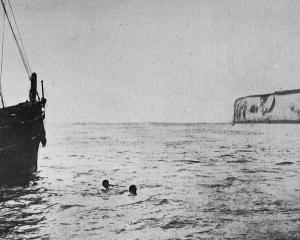Captain A. Carson and his officers described the passage and the weather as the worst they had experienced for some years.
When asked regarding the chances of the Manchester, they shook their heads and said that it would be miraculous if she had weathered the terrific gales and seas that had swept the Tasman Sea during the past fortnight.
The Waihora had been compelled to heave-to for over 41 hours, so bad was the weather.
They had kept a sharp look-out for the missing dredge Manchester all the trip, but had seen no sign of her, or of any wreckage. The log-book of the Waihora was a record of continuous bad weather, the entry, "shipping water fore and aft" being made every watch.
• Loaded down to her mark with 6500 tons of coal, the Waihora left Newcastle at 6 a.m. on Friday, April 26, and cleared the Nobbys half an hour later.
The weather was fine and clear when the vessel set her course for New Zealand, but there was a moderate southerly breeze, and a heavy sea running. At noon on the Saturday the wind had increased to a gale, and the wallowing collier was shipping heavy seas fore and aft.
Hourly the gale increased in violence, raising a mountainous sea, which crashed on board in tons, filling the vessel's decks. Fierce squalls from the south-south-west swept over the vessel, and the weather became worse during Sunday.
The Waihora wallowed and rolled terrifically in the huge seas, and at last the position became so bad that the big steamer had to ease her engines and heave-to, at 1.45 p.m. on Monday. The log-book entries showed that a hard gale was blowing, and that the vessel was shipping dangerous seas fore and aft.
A momentary lull at 11 o'clock on the Monday night induced Captain Carson to put the Waihora on her course, but in 20 minutes she had to be hove-to again, so dangerous was the sea. All through Monday night, the whole of Tuesday, and until early on Wednesday morning the vessel was lying-to in the howling gale, her decks being continually awash.
At last, after being hove-to for 41 hours, the Waihora was put on her course once more at 6.50 a.m. on Wednesday. The weather had moderated slightly, but the S.S.W. gale and high seas continued all the way to the New Zealand coast, and the deeply-laden collier had an exceedingly bad time. She was shipping heavy water the whole time, and laboured and rolled heavily in the high beam seas.
• Sunday next has been set apart by the Young Men's Christian Associations throughout the world as "mothers' day". At the local association plans are being made for the celebration of the day. At 4.15 p.m. a men's meeting will be held in the association rooms, and short addresses bearing on the influence of home and mother will be given, after which each man present will receive a white flower in memory of his mother. Last year "mothers' day" was observed in the Associations of Alaska, Philippine Islands, United States, Canada, Mexico, Europe, Madagascar, Fiji, Barbadoes, China, Japan, Korea, Africa, Palestine, Australia, and New Zealand. Those in charge of the arrangements at the local association are expecting and preparing for a large gathering of men. - ODT, 8.5.1912.
• COPIES OF PICTURE AVAILABLE FROM ODT FRONT OFFICE, LOWER STUART ST, OR WWW.OTAGOIMAGES.CO.NZ












